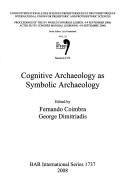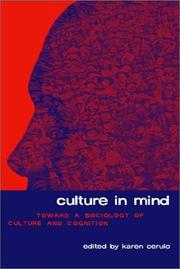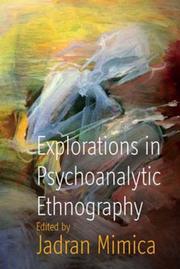| Listing 1 - 10 of 386 | << page >> |
Sort by
|

ISBN: 9781407301792 Year: 2008 Publisher: Oxford : Archaeopress,
Abstract | Keywords | Export | Availability | Bookmark
 Loading...
Loading...Choose an application
- Reference Manager
- EndNote
- RefWorks (Direct export to RefWorks)

ISBN: 0415929431 041592944X Year: 2002 Publisher: New York : Routledge,
Abstract | Keywords | Export | Availability | Bookmark
 Loading...
Loading...Choose an application
- Reference Manager
- EndNote
- RefWorks (Direct export to RefWorks)

ISBN: 0857456946 1845454022 Year: 2008 Publisher: New York : Berghahn Books,
Abstract | Keywords | Export | Availability | Bookmark
 Loading...
Loading...Choose an application
- Reference Manager
- EndNote
- RefWorks (Direct export to RefWorks)
Whereas most anthropological research is grounded in social, cultural and biological analysis of the human condition, this volume opens up a different approach: its concerns are the psychic depths of human cultural life-worlds as explored through psycho-analytic practice and/or the psychoanalytically framed ethnographic project. In fact, some contributors here argue that the anthropological interpretation of human existence is not sustainable without psychoanalysis; others take a less extreme radical stance but still maintain that the unconscious matrix of the human psyche and of the inters
Book
ISBN: 3959344791 9783959344791 9783959349796 Year: 2016 Publisher: Hamburg, Germany : Diplomica Verlag,
Abstract | Keywords | Export | Availability | Bookmark
 Loading...
Loading...Choose an application
- Reference Manager
- EndNote
- RefWorks (Direct export to RefWorks)
Book
Year: 1969 Publisher: New York Holt, Rinehart and Winston
Abstract | Keywords | Export | Availability | Bookmark
 Loading...
Loading...Choose an application
- Reference Manager
- EndNote
- RefWorks (Direct export to RefWorks)
Book
Abstract | Keywords | Export | Availability | Bookmark
 Loading...
Loading...Choose an application
- Reference Manager
- EndNote
- RefWorks (Direct export to RefWorks)
Book
Year: 2021 Publisher: Cambridge, UK : Open Book Publishers,
Abstract | Keywords | Export | Availability | Bookmark
 Loading...
Loading...Choose an application
- Reference Manager
- EndNote
- RefWorks (Direct export to RefWorks)
This volume brings together a collection of seven articles previously published by the author, with a new introduction reframing the articles in the context of past and present questions in anthropology, psychology and human evolution. It promotes the perspective of 'integrated' social science, in which social science questions are addressed in a deliberately eclectic manner, combining results and models from evolutionary biology, experimental psychology, economics, anthropology and history. It thus constitutes a welcome contribution to a gradually emerging approach to social science based on E. O. Wilson's concept of 'consilience'. Human Cultures through the Scientific Lens spans a wide range of topics, from an examination of ritual behaviour, integrating neuro-science, ethology and anthropology to explain why humans engage in ritual actions (both cultural and individual), to the motivation of conflicts between groups. As such, the collection gives readers a comprehensive and accessible introduction to the applications of an evolutionary paradigm in the social sciences. This volume will be a useful resource for scholars and students in the social sciences (particularly psychology, anthropology, evolutionary biology and the political sciences), as well as a general readership interested in the social sciences.
Book
Year: 2021 Publisher: Cambridge, UK : Open Book Publishers,
Abstract | Keywords | Export | Availability | Bookmark
 Loading...
Loading...Choose an application
- Reference Manager
- EndNote
- RefWorks (Direct export to RefWorks)
This volume brings together a collection of seven articles previously published by the author, with a new introduction reframing the articles in the context of past and present questions in anthropology, psychology and human evolution. It promotes the perspective of 'integrated' social science, in which social science questions are addressed in a deliberately eclectic manner, combining results and models from evolutionary biology, experimental psychology, economics, anthropology and history. It thus constitutes a welcome contribution to a gradually emerging approach to social science based on E. O. Wilson's concept of 'consilience'. Human Cultures through the Scientific Lens spans a wide range of topics, from an examination of ritual behaviour, integrating neuro-science, ethology and anthropology to explain why humans engage in ritual actions (both cultural and individual), to the motivation of conflicts between groups. As such, the collection gives readers a comprehensive and accessible introduction to the applications of an evolutionary paradigm in the social sciences. This volume will be a useful resource for scholars and students in the social sciences (particularly psychology, anthropology, evolutionary biology and the political sciences), as well as a general readership interested in the social sciences.
Book
ISBN: 1586421921 Year: 2007 Publisher: Hanover, N.H. : Steerforth Press,
Abstract | Keywords | Export | Availability | Bookmark
 Loading...
Loading...Choose an application
- Reference Manager
- EndNote
- RefWorks (Direct export to RefWorks)
Ethnopsychology. --- Cognition and culture. --- Ethnopsychology --- Cognition and culture
Book
ISBN: 2738174809 9782738174802 Year: 2013 Publisher: Paris : Odile Jacob,
Abstract | Keywords | Export | Availability | Bookmark
 Loading...
Loading...Choose an application
- Reference Manager
- EndNote
- RefWorks (Direct export to RefWorks)
4e de couv.: Depuis des décennies, les anthropologues voient dans l'esprit le produit exclusif d'une culture coupée de toute base biologique ou naturelle. Ils ignorent ou rejettent ce que les sciences neuronales et la psychologie cognitive nous apprennent sur le fonctionnement de l'esprit humain. Occupés à distinguer l'inné du culturel, leurs critiques cognitivistes sont quant à eux enfermés dans la même dichotomie. Pour surmonter cette opposition, il faut se représenter la cognition humaine non comme un état de choses statique, mais comme un processus unifié : une dynamique au sein de laquelle on peut distinguer l'histoire et les transformations du développement cognitif individuel, qui se déroulent ensemble. Retrouver une conception unitaire de l'esprit humain, telle est l'entreprise de ce livre novateur. Reprenant des questions classiques et controversées - le temps, le moi et la personne, les catégories de la pensée, la mémoire -, il montre quels bénéfices l'anthropologie pourrait tirer d'un dialogue avec les sciences cognitives.
Anthropology. --- Cognition and culture. --- Ethnopsychology.
| Listing 1 - 10 of 386 | << page >> |
Sort by
|

 Search
Search Feedback
Feedback About UniCat
About UniCat  Help
Help News
News